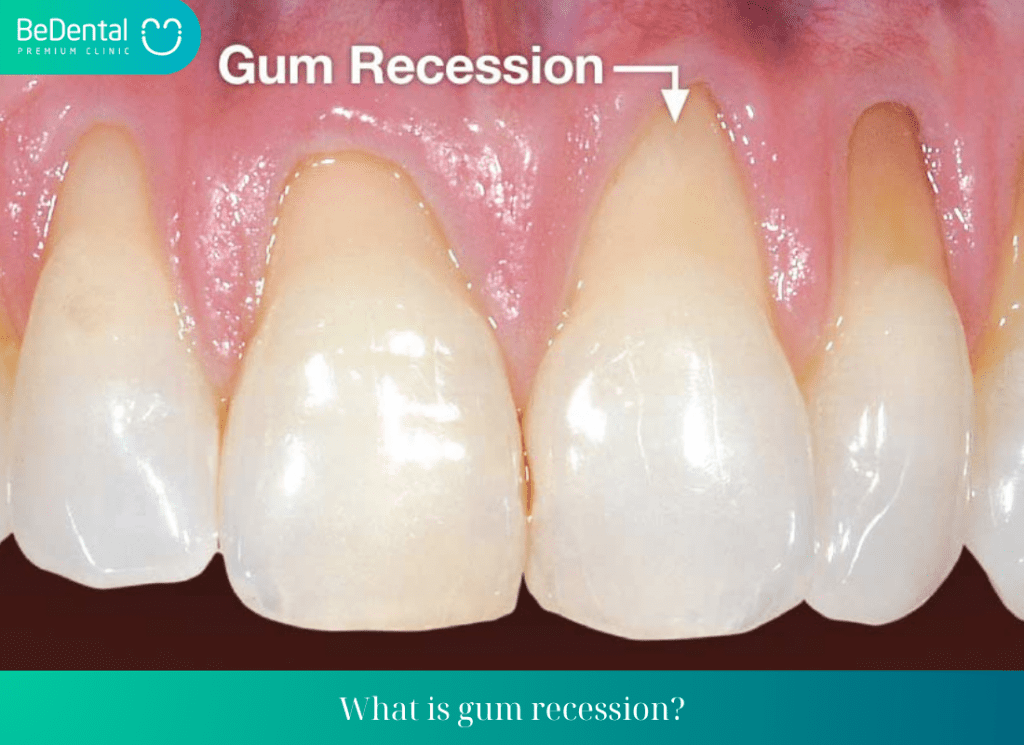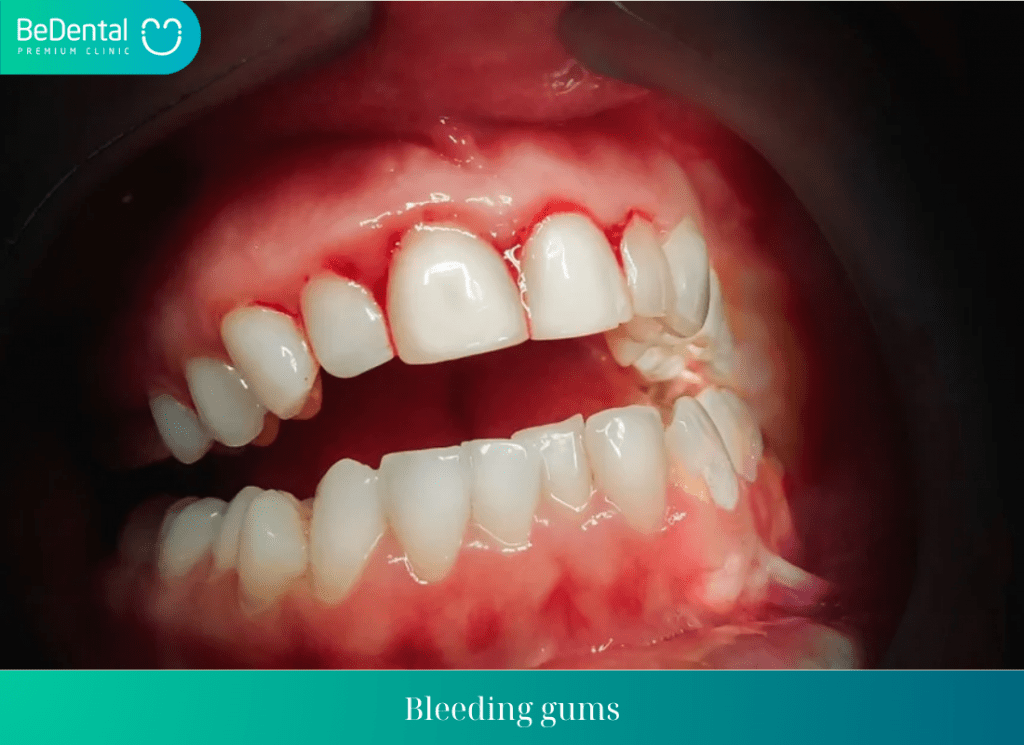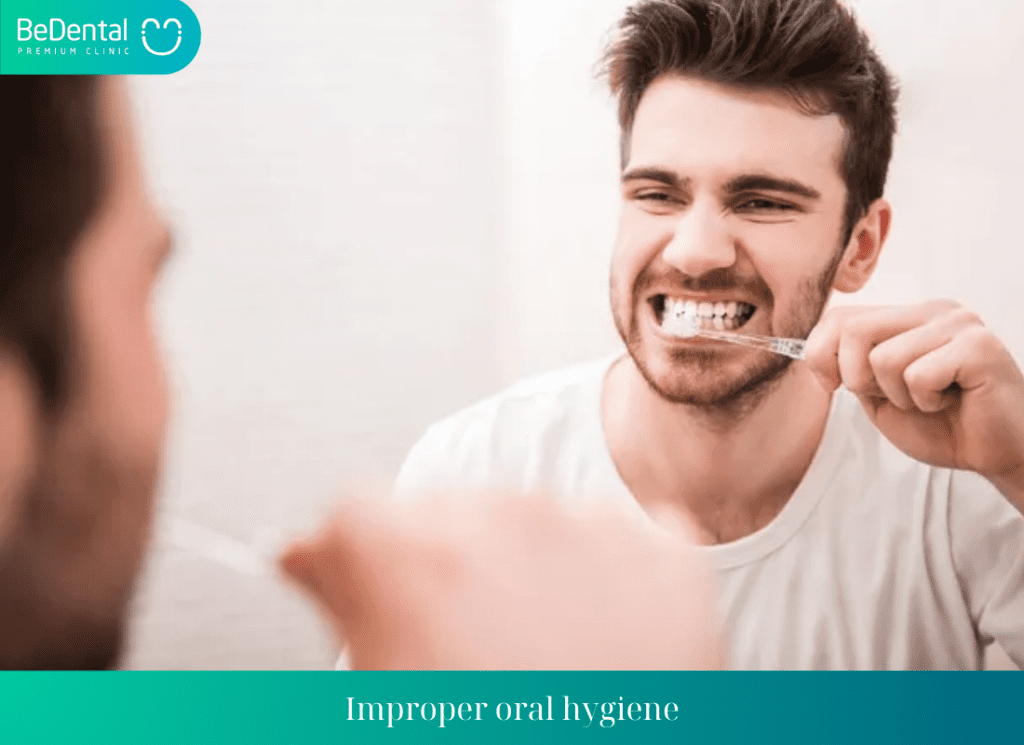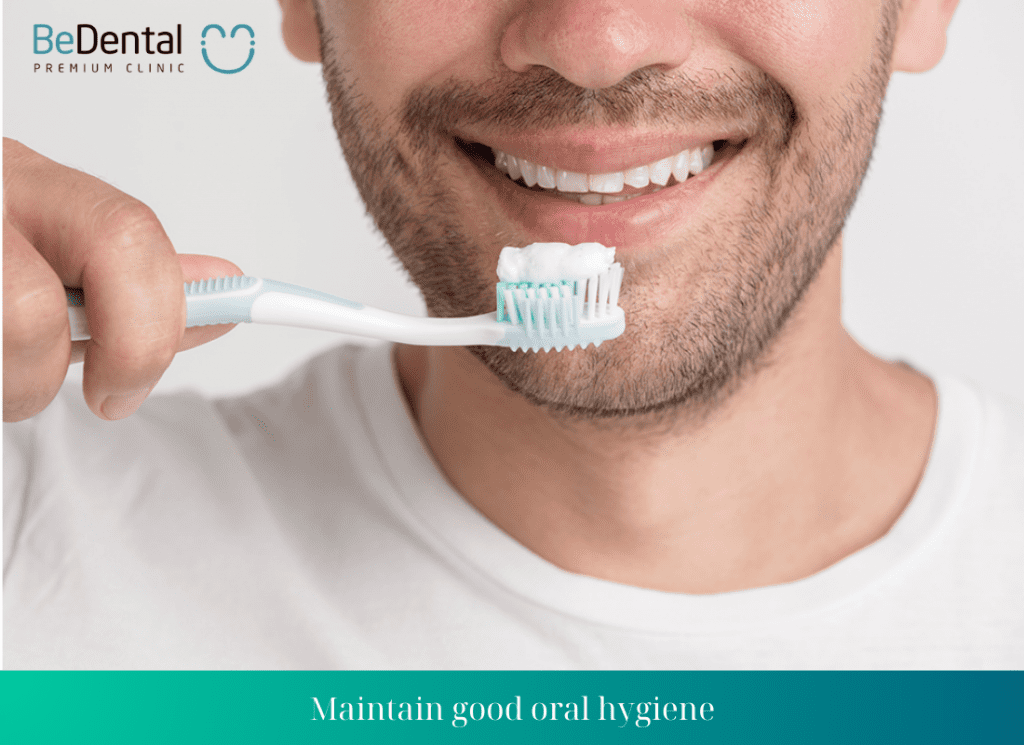Signs of gum recession during braces – The braces process not only brings perfect aesthetic beauty to the smile but also is a significant medical procedure, but at the same time carries the risk of dental diseases, including gum recession. so What is gum recession? What are the Signs of gum recession during braces? The following article will clarify the causes, remedies, and signs of gum recession during braces.
What is gum recession? Signs of gum recession during braces
What is gum recession?

Gum recession, also known as gingival recession, is a common condition that can occur during orthodontic treatment with braces. It is characterized by the gradual movement of the gum tissue away from the tooth, exposing the tooth’s root. This exposure can lead to increased sensitivity to hot and cold temperatures, as well as potential aesthetic concerns due to the appearance of longer teeth.
While the signs of gum recession may not be immediately noticeable, over time, individuals may experience symptoms such as tooth sensitivity, visible roots of the teeth, and changes in the appearance of the gum line. It is important to be aware of these potential indicators of gum recession and take proactive steps to address them in order to maintain optimal oral health throughout the orthodontic treatment process.
See more: What is Abutment?
Signs of gum recession during braces
Exposed tooth roots – Signs of gum recession during braces
When the tooth roots are more exposed than usual, it not only makes the teeth appear longer but can also create cosmetic and dental health issues. This phenomenon often causes self-consciousness and lack of confidence when smiling, talking, or laughing, especially when the tooth roots are excessively exposed, making the smile unbalanced and uneven.
Sensitive teeth – Signs of gum recession during braces
When the tooth roots are exposed, tooth sensitivity is often a common issue that many people face. Tooth sensitivity can cause pain and discomfort when in contact with hot, cold, or sweet foods, and can affect the patient’s daily quality of life.
Swollen and red gums – Signs of gum recession during braces
When the gums are swollen and red, it is often a sign of gum inflammation, one of the most common dental issues. This condition not only causes discomfort but can also affect overall dental health if not treated promptly and correctly.
Bleeding gums – Signs of gum recession during braces

Gums bleeding easily when brushing or using dental floss. The phenomenon of gum bleeding when brushing or using dental floss is a sign not to be ignored and is often a warning signal that there may be issues with overall gum and oral health.
Bad breath – Signs of gum recession during braces
Bad breath is a common problem and often causes discomfort and self-consciousness for those affected. Although there are various causes, bacteria accumulating in the exposed tooth root area is often a significant cause of this condition.
See more: Dental implants
Plaque buildup and higher tooth sensitivity – Signs of gum recession during braces
When the tooth roots are exposed, it not only increases the likelihood of plaque buildup and tooth sensitivity but also leads to a range of other dental problems, especially when not properly cared for. Exposed tooth roots create an ideal environment for bacterial growth and plaque formation, and when plaque accumulates and is not removed properly, it can lead to severe dental issues.
Discomfort or pain in the gums – Signs of gum recession during braces
The area where the gums have receded can cause discomfort or pain, especially when eating. Discomfort or pain in the gums is a common symptom when the gums have receded. When the tooth roots are exposed, the gums are no longer tightly wrapped around them as usual, which can increase sensitivity and pain in the receded gum area, particularly when in contact with food or water.
What are the causes of gum recession during braces?
Suffering from oral diseases
Gum recession during braces may be due to oral diseases. Gum recession will occur if the patient does not treat oral diseases such as gum inflammation, root inflammation before and during the braces process. Therefore, to achieve the best orthodontic results and avoid the risk of gum recession, proper oral hygiene is necessary.
Improper oral hygiene
Improper oral hygiene can lead to many serious problems, including gum recession. This is a condition where the gum tissue gradually recedes or moves deeper towards the tooth’s root, exposing the tooth’s root.
See more: Do braces cause toothloss?

Improper tightening force of braces
When braces are tightened too tightly, the pressure on the gums and teeth can cause damage to the gum tissue. This pressure reduces blood flow to the gums, leading to gum inflammation, weakening, and gradual recession.
Poor chewing habits
Inappropriate chewing habits, such as intentionally eating hard, tough foods regularly, can lead to issues such as braces coming loose, breaking, or even causing teeth to become loose and recede. Therefore, during the braces process, it is necessary to limit consumption of tough and hard foods.
Ways to address gum recession during braces
- Adjust the braces system to keep the teeth stable and in their new position.
- Design and use a new set of braces to maintain the teeth in the desired position and prevent recurrence of gum recession.
- Gum tissue graft surgery if the gums are swollen, painful, and causing changes in the teeth’s position.
- Re-bracing in cases of severe gum recession to ensure long-term results and stability of the braces.
- Regular follow-up visits with a dentist to intervene promptly and ensure the effectiveness of the braces process.
See more: Zirconia bridge and 5 tips you should know
Preventive measures to avoid gum recession during braces
Regular oral health care

Perform proper oral hygiene by brushing teeth at least twice a day and using dental floss and mouthwash to clean between teeth.
Adjust braces tightening force
Adjusting the braces tightening force is an important factor in the orthodontic process, not only to achieve the best results but also to reduce the risk of gum recession and other issues related to excessive pressure on the gums and teeth. Improper or uneven adjustment of the braces tightening force can lead to various dental problems, including damage to the gum tissue, teeth, and bones, reducing the effectiveness of the braces process.
- Practice Proper Hygiene: Brush twice daily, floss, and use mouthwash to clean between teeth and around braces.
- Adjust Braces Properly: Ensure optimal tightening to avoid gum recession or damage to teeth and bones.
- Avoid Hard Foods: Minimize stress on braces and reduce the risk of gum issues by limiting hard and tough foods.
- Follow Dentist’s Advice: Adhere to care and maintenance instructions for effective treatment.
- Schedule Regular Check-Ups: Visit your dentist for timely adjustments and progress monitoring.
- Address Issues Early: Treat gum or tooth problems promptly to maintain healthy teeth and stable braces.
See more: Implant osstem
Most asked questions
1. Are there any risk factors that may increase the likelihood of gum recession?
Several risk factors can increase the likelihood of gum recession, including:
- Poor oral hygiene habits leading to plaque buildup and gum disease.
- Bruxism (teeth grinding) or clenching, which can put excessive pressure on the gums.
- Genetics, as some individuals may have a predisposition to gum recession.
- Misaligned teeth or malocclusion, which can cause uneven stress on the gums.
- Tobacco use, as smoking or chewing tobacco can impair blood flow to the gums and increase the risk of gum disease and recession.
- Hormonal changes, such as during pregnancy or menopause, which can affect gum health and increase susceptibility to gum recession.
2. What oral hygiene practices can help maintain gum health and prevent recession?
Maintaining good oral hygiene practices is essential for preventing gum recession. Some oral hygiene practices that can help maintain gum health include:
- Brushing your teeth at least twice a day with a soft-bristled toothbrush and fluoride toothpaste.
- Flossing daily to remove plaque and debris from between the teeth and along the gumline.
- Using an antimicrobial mouthwash to reduce bacteria and plaque buildup in the mouth.
- Regular dental check-ups and cleanings to monitor gum health and address any issues early on.
- Avoiding tobacco use, which can contribute to gum disease and recession.
- Eating a balanced diet rich in fruits, vegetables, and whole grains to support overall oral health.
3. How does gum recession impact overall oral health and tooth stability?
Gum recession can have several negative impacts on overall oral health and tooth stability, including:
- Increased sensitivity to hot and cold temperatures due to exposed tooth roots.
- Greater risk of tooth decay and cavities as the roots are more vulnerable to bacterial attack.
- Weakening of tooth support structures, leading to potential tooth mobility or loss.
- Aesthetic concerns, such as longer-looking teeth and uneven gum lines.
- Potential development of gum disease, as recession exposes the roots to bacteria and debris.
See more: Zygoma implants
The above article has helped you reveal everything about signs of gum recession during braces. Contact Bedental if you want advice on appropriate methods to have more precious information, we will provide free help 24/7.
Tư vấn chuyên môn bài viết:
BÁC SĨ DƯƠNG THỊ THÙY NGA
Bác sĩ chỉnh nha tổng hợp
Ngôn ngữ giao tiếp: Tiếng Việt, Tiếng Anh, Tiếng Nga





